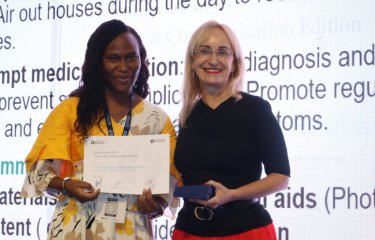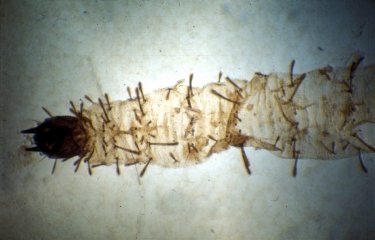Encephalitis is an acute inflammation of the brain tissue that affects children and adults, especially in South-East Asia. Researchers and physicians involved in the "South-East Asia encephalitis" (SEAe) project, coordinated by the Institut Pasteur in collaboration with the Pasteur Network, have demonstrated the importance of prevention as well as rapid and appropriate diagnosis and treatment of patients suffering from encephalitis. Results suggest that vaccination against Japanese encephalitis alone could reduce its prevalence by one third. The results of this study conducted in 4 countries in the Greater Mekong Region (Cambodia, Laos, Vietnam, and Myanmar) were published in The Lancet Global Health on 14 June 2022.
Encephalitis is inflammation that can result from a brain parenchyma infection, the functional tissue of the brain, or as a result of autoimmune response. It is a worldwide public health concern because of its high mortality rate and the neurological sequelae it causes. However, its causes often remain unknown. Viruses are the most frequent in case of infection but other pathogens may be responsible.
The South-East Asia Encephalitis (SEAe) Consortium, which brings together physicians and scientists from South-East Asia and Europe, has conducted the largest prospective multicenter study of childhood encephalitis in South-East Asia. This study consisted of a harmonized diagnostic system in four referral hospitals in Cambodia, Laos, Vietnam and Myanmar. The system used three successive steps to rapidly identify the most commonly encountered pathogens for which treatment is available, identify other known pathogens, and finally explore other diagnoses and identify unknown pathogens.
Of 694 children included, 664 had encephalitis. A cause was identified in 64% of cases. The most common cause was Japanese encephalitis virus infection (33% of patients). The scientists also identified cases associated with dengue virus infection, influenza, herpes simplex virus 1, Mycobacterium tuberculosis, pneumococcus, enterovirus 71, other infectious agents (with more than 30 pathogens identified), and autoimmunity. Of all the causes identified, 18% were treatable and 42% could have been prevented by vaccination.
By the end of their hospital stay, 13% of the children had died, 23% had severe neurological sequelae, 30% had slight or moderate neurological sequelae, and 34% no sequelae. The risk factors for death or severe neurologic sequelae were related to meningeal tuberculosis, the presence of respiratory failure with oxygen requirements, the presence of prolonged coma, and delayed care.
"The data generated by this study will help in the development of diagnostic and preventive management recommendations for encephalitis in the Greater Mekong Region. They underline the importance of national mass vaccination campaigns targeting the Japanese encephalitis virus," said Marc Lecuit, head of the Infection Biology Unit at the Institut Pasteur (Université Paris Cité, Inserm), also affiliated with Université Paris Cité and Hôpital Necker-Enfants malades AP-HP, and co-coordinator of the study.
Source
Childhood encephalitis in the Greater Mekong region (the SouthEast Asia Encephalitis Project): a multicentre prospective study, The Lancet Global Health, June 14, 2022
Jean-David Pommier*, Chris Gorman*, Yoann Crabol*, Kevin Bleakley, Heng Sothy, Ky Santy, Huong Thi Thu Tran, Lam Van Nguyen, Em Bunnakea, Chaw Su Hlaing, Aye Mya Min Aye, Julien Cappelle, Magali Herrant, Patrice Piola, Bruno Rosset, Veronique Chevalier, Arnaud Tarantola, Mey Channa, Jerome Honnorat, Anne Laure Pinto, Sayaphet Rattanavong, Manivanh Vongsouvath, Mayfong Mayxay, Sommanikhone Phangmanixay, Khounthavy Phongsavath, Ommar Swe Tin, Latt Latt Kyaw, Htay Htay Tin, Kyaw Linn, Thi Mai Hung Tran, Philippe Pérot, Nguyen Thi Thu Thuy, Nguyen Hien, Phuc Huu Phan, Philippe Buchy, Philippe Dussart, Denis Laurent, Marc Eloit†, Audrey Dubot-Pérès†, Olivier Lortholary†, Xavier de Lamballerie†, Paul N Newton†, Marc Lecuit†#, on behalf of the SEAe Consortium
* Joint first authors
† Joint senior authors
# Corresponding author
DOI : https://doi.org/10.1016/S2214-109X(22)00174-7
About the South East Asia encephalitis (SEAe) Consortium
The South East Asia Encephalitis (SEAe) Consortium brings together physicians and researchers from Europe and countries affected by childhood encephalitis in South-East Asia. It brings together a number of complementary partners with the aim of addressing some of the most important issues currently raised by encephalitis (including meningoencephalitis) in South-East Asia.
The SEAe consortium partners are
- the national health authorities from four South-East Asian countries (Cambodia, Laos, Myanmar, Vietnam);
- local major university and national hospitals;
- key French stakeholders of life and health sciences such as:
- Institut Pasteur, member of the Pasteur Network, together with the Institut Pasteur du Cambodge and the National Institute of Hygiene and Epidemiology,
- Inserm,
- French Agricultural Research Centre for International Development (CIRAD),
- the Institut de Recherche pour le Développement (French National Research Institute for Sustainable Development) (IRD),
- Aix-Marseille University,
- Ecole des Hautes Études en Santé Publique (EHESP),
- teams from the South-East Asian Wellcome Trust Oxford MOP network.
This project is supported by the TotalEnergies Foundation and the members of Aviesan Sud.





